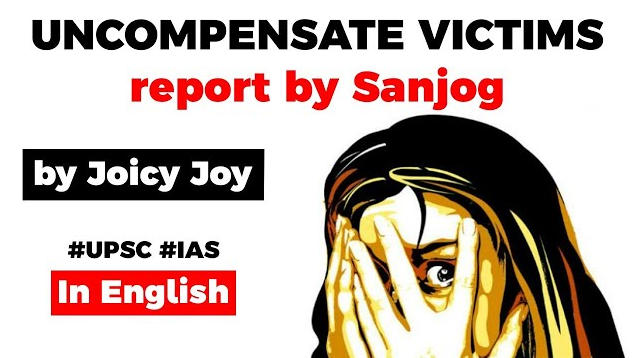Table of Contents
CURRENT AFFAIR
- Based on the data of the NCRB, a non-profit organisation released a report on compensation awarded to survivors of trafficking the country, which highlighted the poor status of compensation awarded during 2011- 2019.
- NCRB reports put the total number of cases of human trafficking at 35,983, but only 82 (0.2%) victims were awarded compensation.
National Crime Record Bureau
- NCRB, headquartered in New Delhi, was set-up in 1986 under the Ministry of Home Affairs to function as a repository of information on crime and criminals so as to assist the investigators in linking crime to the perpetrators.
- It was set up based on the recommendations of the National Police Commission (1977-1981) and the MHA’s Task Force (1985).
- NCRB brings out the annual comprehensive statistics of crime across the country (‘Crime in India’ report).
Key Points
- The report titled ‘UNCOMPENSATE VICTIMS’ was released by Sanjog, a technical resource organisation that works to combat trafficking and gender-based violence.
- Following the national outrage over the Nirbhaya gang-rape case (2012), the government had announced ₹1,000 crore fund to be used to combat sexual violence against persons – children or adults.
- The amount of compensation to victims of trafficking varied from State to State, hence the Supreme Court had directed the National Legal Services Authority (NALSA) to frame a standardised victim compensation
- The study also reflects the number of trafficking survivors who applied for the victim compensation scheme to their respective legal services authority.
- While 107 individuals applied under the scheme, in 102 cases between 2011 and 2019, courts directed the authorities to release compensation.
National Legal Services Authority
- The National Legal Services Authority (NALSA) was constituted under the Legal Services Authorities Act, 1987 which came into force on 9th November, 1995 to establish a nationwide uniform network for providing free and competent legal services to the weaker sections of the society.
- The Chief Justice of India is the Patron-in-Chief and the second senior most Judge of Supreme Court of India is the Executive Chairman of the
- Article 39 A of the Constitution provides for free legal aid to the poor and weaker sections of the society, to promote justice on the basis of equal opportunity. Article 14 and Article 22 (1), obligates State to ensure equality before law.
- The role played by NALSA and its networks is very much relevant to achieving the Sustainable Development Goal-16 , which seeks to “Promote peaceful and inclusive societies for sustainable development, provide access to justice for all and build effective, accountable and inclusive institutions at all levels”.
Compensation Scheme for Women Victims/Survivors of Sexual
- The scheme proposes a uniform payment of Rs. 5 lakh to the maximum of Rs. 10 lakh to gang-rape survivors in any part of the country.
- In the case of rape and unnatural sexual assault, the victim will get a minimum of Rs. 4 lakh and the maximum of Rs. 7 lakh.
- The scheme also says that victim of acid attacks, in case of disfigurement of face, would get a minimum compensation of Rs 7 lakh, while the upper limit would be Rs 8 lakh.
Central Victim Compensation Fund scheme
- The Section 357-A of Code of Criminal Procedure (CrPC) has provisions to compensate victims who suffered because of a
- Section 357A: Every State Government in coordination with the Central Government shall prepare a scheme for providing funds for the purpose of compensation to the victim of crime.
- The government introduced the Central Victim Compensation Fund (CVCF) scheme to enable support to victims of rape, acid attacks, human trafficking and women killed or injured in the cross border firing.
- It is also known as the Victim Compensation Scheme.
- So far 24 states and 7 UTs have formulated the Victim Compensation Scheme.
Nirbhaya Fund
- The Nirbhaya Fund Framework provides for a non-lapsable corpus fund for the safety and security of women.
- It is administered by the Department of Economic Affairs (DEA) of the Ministry of Finance.
- It can be utilized for projects and initiatives related to women safety.
- Nirbhaya fund is being used in the Central Victim Compensation Fund (CVCF).
Reasons Behind the Low Rate of Compensation
- Lack of awareness
- A lack of information provided to survivors on victim compensation.
- Low investment on part of legal aid
- Role of Legal Services Authorities: The study suggests grave inconsistencies on the part of legal services authorities, which have provided the data.
Latest Burning Issues | Free PDF






















 WhatsApp
WhatsApp